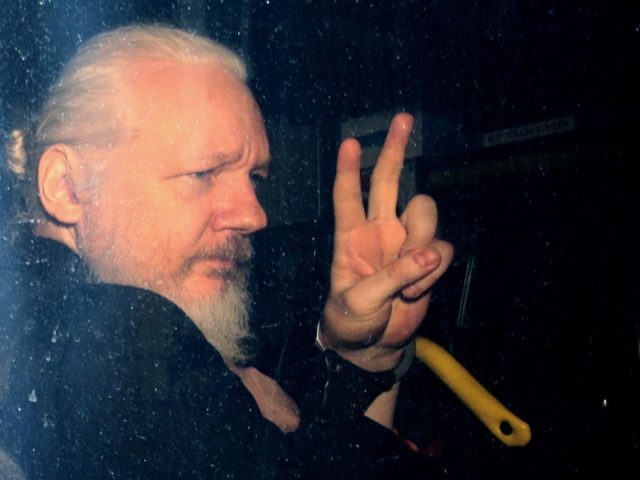The government of Ecuador rescinded Wikileaks founder Julian Assange’s citizenship, granted in January, following his arrest Thursday morning on charges of conspiracy to hack U.S. military computers.
Ecuadorian President Lenin Moreno, whose administration requested that U.K. authorities extract Assange from its embassy in London, disparaged the Australian as a “brat” and “miserable hacker” whose inability to accept Ecuador’s hospitality respectfully made it impossible for Moreno to continue to grant him political asylum.
Assange spent nearly seven years living in the Ecuadorian embassy after Moreno’s predecessor, anti-American firebrand Rafael Correa, offered him asylum to prevent Britain, America, and Sweden from detaining and extraditing the Wikileaks chief. Assange faced charges of rape in Sweden unrelated to the hacking incident, which Stockholm is considering reviving in light of his arrest this week.
Ecuadorian officials told reporters Thursday that the government had completed an investigation into the relationship between Assange and Quito that had revealed “irregularities” in the process of granting the Wikileaks activist citizenship. The investigation reportedly began in October and revealed that Assange had committed fraud to acquire the citizenship.
Foreign Minister José Valencia further revealed Thursday that the country spent over $6.5 million in housing, security, legal aid, and health costs for Assange.
“Ecuador held up its end of the bargain,” Valencia insisted.
“We have suspicions that Mr. Assange deceived the Ecuadorian state with some of the documents and that is in the comptroller’s report, so that that agency can determine if there was fraud or some type of problem in the issuance of citizenship,” presidential secretary Juan Sebastián Roldán explained. As further investigation is required, there is a chance Quito will re-naturalize Assange in the event it does not find sufficient evidence of fraud.
Moreno appeared little inclined to do so in remarks Thursday, however, dismissing Assange as a “miserable hacker” and arguing that he had insulted the Ecuadorian state.
“You can’t come into a house that welcomes you warmly, gives you food, takes are of you, and denounce the owner of the house,” Moreno told an audience at a public event in Latacunga, Ecuador, Thursday. “From now on we have to be very careful giving asylum when the moment arises, to give it to people who are truly worth it and not miserable hackers whose only intent is to destabilize governments.
“We are tolerant, we are tame, but not stupid,” he said.
The president appeared to be referring to Assange’s attempt to sue the government of Ecuador for violating his “fundamental rights and freedoms” last year. Quito responded by arguing that they had made requests reasonable for any houseguest to comply with, such as asking that he clean the litter box for his cat, and Assange had refused to agree to them.
Moreno went on to say that, by “stripping asylum from that brat and fortunately freed ourselves of a pebble in our shoe.”
Conservatives in Ecuador had long demanded the government rid itself of Assange, who came into Quito’s orbit in 2012 during Correa’s tenure. Moreno, a member of Correa’s party, was expected to maintain his policies, but has used his time in office largely to dismantle Correa’s legacy.
Losing his Ecuadorian citizenship leaves Assange with his native Australian citizenship and prompted questions to Canberra on how they will approach his arrest.
“That has nothing to do with us, it has to do with the United States,” Australian Prime Minister Scott Morrison told the country’s ABC television network.
Morrison was not the only one to distance himself from the issue.
“I know nothing about Wikileaks. It’s not my thing,” President Donald Trump told reporters Thursday after similar inquiries from the press. “It’s not my deal in life.”
Valencia, the Ecuadorian foreign minister, told reporters that the arrest occurred after state officials attempted to convince Assange to leave the embassy willingly. Ecuadorian Ambassador to the United Kingdom Jaimé Marchan reportedly issued Assange a message from Valencia asking he vacate the building.
“I offered him the communication and stood up. The gentleman remained seated. I showed him the door and told him, ‘leave immediately’ and peacefully accompanied him to the door,” Marchán told Deutsche Welle.
Assange refused, authorities claimed, so they invited British police to detain him.
American officials are charging Assange with conspiracy to hack into defense computers, claiming that he told leaker Chelsea Manning, then known as Bradley Manning, that he would help break into secure military computers to find damaging information about the U.S. armed forces. Manning was convicted and sentenced to 35 years in prison in 2013 for leaking classified military intelligence to Assange, but received a pardon from President Barack Obama before the end of his term. Manning then attempted to run for political office before being arrested in March for refusing to testify in an investigation into Wikileaks.

COMMENTS
Please let us know if you're having issues with commenting.